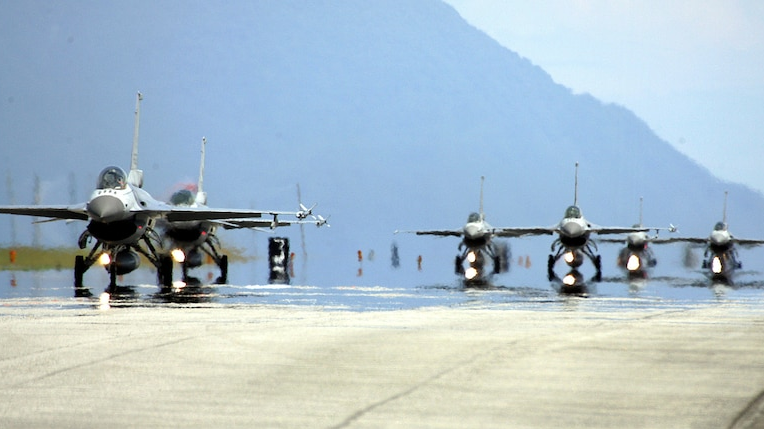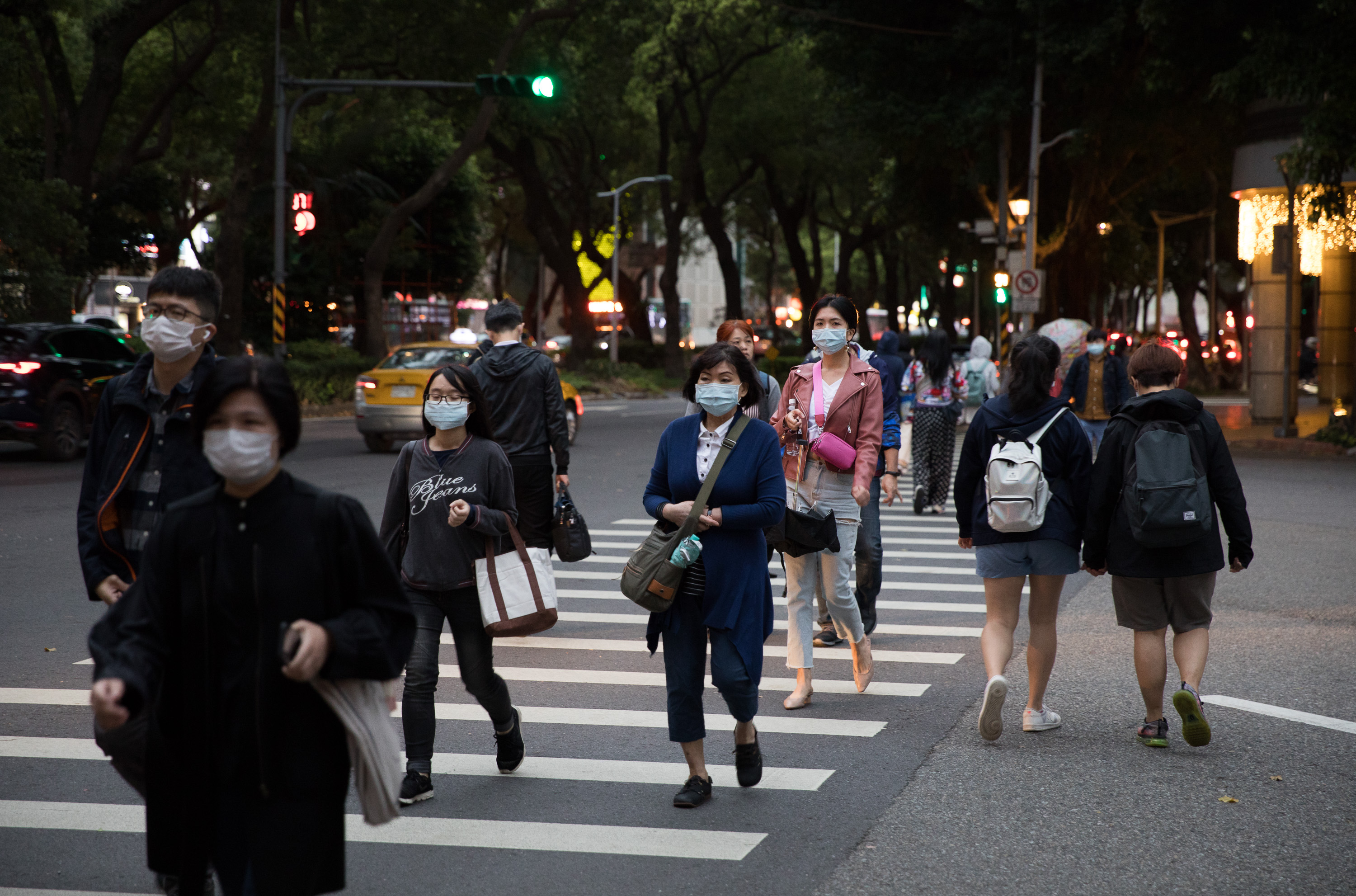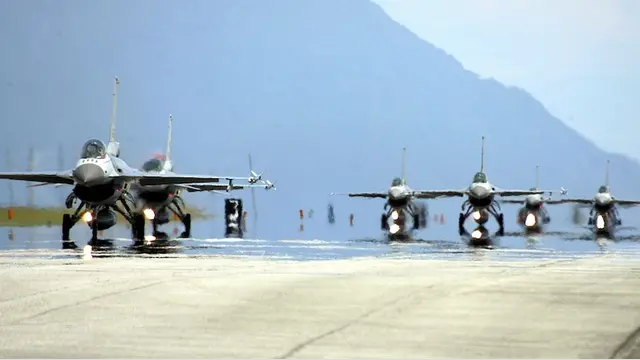
Seven F-16 fighter jets taxi on a runway at Taiwan's Hualien airbase. /Reuters
**Editor's note: **Zhang Hua is an associate research fellow at the Institute of Taiwan Studies of the Chinese Academy of Social Sciences. The article reflects the author's opinions, and not necessarily the views of CGTN.
The Han Kuang Exercise, the largest annual military exercise in Taiwan, is in full swing. This is an old trick in the book of Taiwan authorities to resist national reunification. This year's exercise also reveals the latest developments in Taiwan.
Among them, the most concerning factor is the collusion between the United States and Taiwan region in an attempt to strengthen cooperation on military security, which in turn escalates the China-U.S. strategic rivalry and undermines peace and stability across the Taiwan Straits.
In the 1980s, with the improvement of China-U.S. relations and the restoration of cross-Straits non-governmental exchanges, Chinese mainland's influence on Taiwan was growing. In order to counter the so-called "pressure" from Chinese mainland, the Chiang Ching-kuo administration decided to hold a large-scale military exercise in 1984, which was known as "Han Kuang Exercise."
Since then, the military drill has been carried out on Taiwan Island almost every year. Leading officials of different political parties interpret the drill very differently. Although Chiang Ching-kuo lost confidence in taking back Chinese mainland after fleeing to Taiwan, he still hankered after the reunification with Chinese mainland, so he named the excise "Han Kuang" (meaning "Glory of Han" in Chinese).
However, elected officials of DPP, such as Chen Shui-bian and Tsai Ing-wen, see the drill in a very different light. They have turned it into a show of muscle-flexing as part of their broad separatist agenda. During the Ma Ying-jeou administration when cross-Straits relations were characterized by peaceful development, the same exercise was held, but more had been talked about the military's role in disaster relief.
In the military exercise this year, the Tsai Ing-wen administration is fiddling with its procedures and presenting a slightly different drama.
First of all, the two phases of the drill are reversed, which means the live fire exercises will come before computer-simulated war gaming. There are two stages in the Han Kuang Exercise: one is computerized war games, while the other is field training exercises.
In previous Han Kuang exercises and in many other military exercises in countries and regions around the world, usually live fire exercises are held after computerized gaming in order to verify the assumptions made in the first stage. According to Taiwan authorities, things will be different this time, citing the impact of coronavirus pandemic.
Secondly, equally dramatic is the mortal accidents occurring in the run-up the drill. Han Kuang Exercise is no stranger to accidents such as plane crash or armored vehicle collision. However, most accidents happened during an exercise rather than before it. Unfortunately, at the preparatory stage of this year's exercise, a Marine Corps dinghy capsized, causing two members to drown and one soldier to commit suicide.
Thirdly, the political ramification of the drill this year is different from past ones. In the political arena of the island, there is generally no objection from any political forces to strengthening Taiwan's security. Even if there is, it often comes from opposition party members.

A street view in Taipei, China's Taiwan region, March 30, 2020. /Xinhua
However, the most vehement criticism of the Han Kuang Exercise this time comes surprisingly from members of the ruling party, including legislators and think tank members within the DPP. Their vocal opposition has significantly pared down the effect of the Tsai administration's sinister attempts to use the exercise as a lever for political maneuvering.
Their criticism, however inconvenient for Tsai, does hold water. The Han Kuang Exercise is indeed a fireworks show and a drama played to entertain Taiwan authorities. Be it the scenario assumed for the exercise, the implementation of the drill process or its final presentation, the drill is far from reflecting a real modern warfare. Besides, those bigoted politicians' assumptions are also unwittingly wrong.
To maintain Taiwan's security, you cannot bet on live fire exercises, instead, you need to seek political resolutions to security challenges. In other words, only when the Taiwan authorities recognize the "1992 Consensus" establish political mutual trust with Chinese mainland, and resume cross-strait talks, can Taiwan's security be assured.
Things have changed drastically after decades of development on both sides of the strait. With Chinese mainland's GDP being 20 times that of Taiwan, the two are not in the same league in terms of economic and military might. Taiwan will soon crumble from within if it engages in an arms race with Chinese mainland.
However, the Tsai administration shows complete disregard of the past lessons by edging closer to the U.S. under the delusion that it can hide under the protective wings of the superpower. With the China-U.S. strategic rivalry continuing to escalate in recent years, the U.S. is keen on playing the Taiwan card to cause more troubles to Chinese mainland, which provides the Tsai administration with space and opportunities for political grandstanding.
In the Han Kuang Exercise, signs of the U.S. involvement cannot be more obvious. U.S. veterans are allowed to observe the drill, while active-duty U.S. military officers provide guidance and assistance to their "Taiwan counterparts." The U.S. military takes the liberty to intervene in this exercise on the pretext of honoring the U.S. laws including so-called Taiwan Travel Act and National Defense Authorization Act.
But such a move has implications way beyond U.S. law enforcement and U.S.-Taiwan relations. It's a matter of China-U.S. relationship that concerns the peace and stability across the Taiwan Straits.
The Taiwan issue is part of China's core interests and shall not be interfered with by external forces. The Chinese government's exercise of sweeping jurisdictions over Hong Kong is a testament to the determination, will and ability of the Chinese government and people to defend sovereignty, security and development interests. It will be wise for the U.S. and Tsai's administration to draw a lesson and tread carefully.
(If you want to contribute and have specific expertise, please contact us at
 简体中文
简体中文





